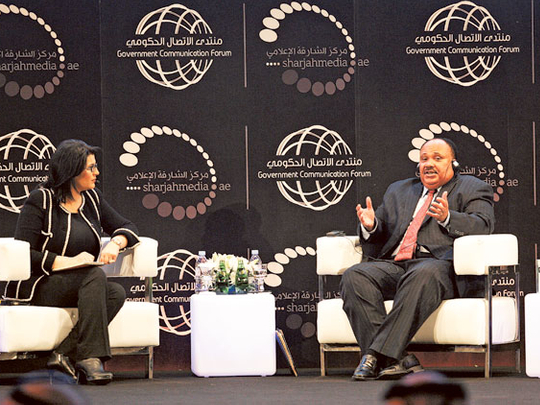
Sharjah: Martin Luther King III, human rights advocate and community activist, said that no one can tell a nation what it should do as people can find a course of action suitable for them.
He was responding to a comment of one of the audience members, at the Government Communication Forum in Sharjah, who said that dignity, not democracy, is the priority of Arab nations.
King, who is the son of Martin Luther King Jr, leader of the US Civil Rights movement from the mid-1950s until his assassination in 1968, also spoke about his father, non-violent protests, frustration of the masses when not heard and its dangers, as well as the importance of dialogue.
The two-day forum concluded yesterday at the Sharjah Expo Centre and saw many esteemed speakers and guests from around the world including Turkish Prime Minister Recep Erdogan and former secretary general of the Arab League, Amr Mousa.
“No one in the planet can ever tell anyone else what they should do. For example, I do not go around the world trying to say somebody needs to be democratic. If that is what people want to do, then I think the US has a democratic structure and a lot of countries do too and we can say, ‘here is a model to consider’,” King said.
He added that he believes that there are portions of the civil rights movement that his father led that might be applicable to any society. “And how that applies is the people of a particular region must say that this is how we think this applies to our community or our nation and that there are aspects of it that we can use.”
King said that he believes that one of the most important things is indeed dignity — noting that dignity might mean different things to different cultures, “but overall, I think dignity is what many are striving for”.
“No one can tell any nation what it should want. The nation should determine what they want and how to make their nation become as best as it can become — all of us want our nations to be the best of what they can become, for our children.” King said
Non-violent protest
King said that said that his father thought that “if people do not have a forum to voice their point of view, they often become angry and that could lead to violence and so what he did was that he and his team could utilise a non-violent method of protest.”
His father and his team, King said, put a strategic plan in place to knock down barriers in a non-violent way. “Had dad chosen to use violence he would have been immediately annihilated,” he added. His father, he said, used a method of non-violent resistance and found a way to communicate his message.
Non-violent protest and rallying for a cause are important, King said, but it is very important that there is also an actual dialogue between those people and the government.
King said, “What we have still not learned is how to treat our fellow human beings... We have to find a way to coexist without doing harm to one another and that is whether it’s in the United Stated or in the Middle East or in the African continent or in Asia or anywhere on the planet.”
Talking about the the differences or similarities between his and his father’s work, King said that the basic foundation was similar, but the issues are more complicated.
On collective leadership vs a leadership of one
King was asked whether people needed a collective leadership or an individual inspirational leadership for their causes. He said that he did not know if he can say whether it should be one or the other, “it ultimately becomes whatever force will bring about the change; sometimes that is collective, sometimes that is one.” He said that he would like to think that it is ideal to have a collective leadership “but this might not always be the case”.











